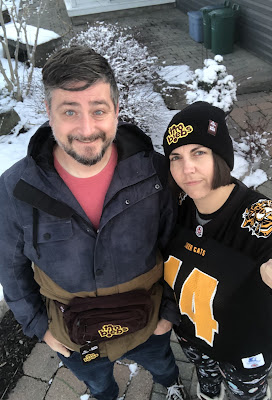Our family journey with three daughters. It takes a village. It takes love. It takes grace. At this time, it even takes unicorns. "That our daughters may be as pillars..." Psalm 144:12
Sunday, September 18, 2022
Good Child
Thursday, August 4, 2022
To 15 years!
To the last five years. As I reflect, they were not easy ones. Readers, if you didn’t read about the first 10 years, click the link below, if it suits you. If you don’t like to read, but want to see us as teenagers, you can just look at the pictures.
2018 - Life was pretty quiet publicly. The things I was going through I (still) can’t write about or publicly document, though I do have freedom to speak about these events more generally now. I refer to this as the year of trauma. In family life, we learned what it was like to have a child with a disability (not traumatic, but tough during an already stressful time) and navigated those diagnoses without a map and many therapy appointments to take up our spare time. Becoming an aunt and uncle again was the best news that year.
2019 - My maternal grandmother, Gloria, struggled with her health and I spent a lot of time with her. I recovered from PTSD/burnout/anxiety/depression as a result of the aforementioned 2018 trauma. Chris “retired” from youth pastoring at Kingsview and went on to work part-time with a ministry called 2CBeyond. He helped run inflatables for churches in Northern Ontario. Chris had a pulmonary embolism and almost died Labour Day weekend that year. Thanks to West-Lincoln Memorial Hospital staff who saved his life that day. We began to live life on one-income for a stretch much longer than we originally planned. Calvary Church in Dunnville offered rest and healing.
 |
| Paris, ON, Swiss Chalet - 2019 |
2020 - We lost our friend, Peter, in January. Heaven is his home but our hearts (especially Chris’) still hurt regularly as a result of that loss. Chris had just received clearance to go back to work and the pandemic lockdown hit the next day. Chris lost his paternal grandfather, John, and maternal grandmother, Marion, at the start of the COVID-19 lockdown. We journeyed with Mountainside Church in Binbrook to learn about their church planting process and offered one another encouragement during the pandemic. After his 6-week stretch of being an employee of 2CBeyond, Chris then switched to volunteer his time on the board of the charity. He helped close down the ministry due to the pandemic. Using home equity, we purchased a cottage to renovate at Braeside Camp. Pipe dream achieved. A boy was finally born on the Whitley side, aunt and uncle again! I also let Chris take a shaver to my head and I feel this is worthy of mention.
 |
| Shaved hair, don't care, because, baby snuggles - 2020 |
 |
| Ice Dogs - 2021 |
2022 - Way Church gained momentum we added a service to the the roster on Thursday evenings. Chris and his friend use Inflatable Impact (a rebirth of 2CBeyond his friend invested in as a not-for-profit) to serve the community local to us and let them know the church is FOR them, not against them. Our kids live their best lives at Braeside while we renovate, in hopes of future relaxation, campfires and conversations with family and friends, and possibly rentals. One of our children fell in love with volleyball, one is still set on being an artist and the last, the family comedian. Hearts full.
 |
| One of my favs - 2021 |
P.S. - I am still teaching at Bellmoore and watching Grey's Anatomy!
Tuesday, January 18, 2022
On Church Hurt
That was probably my first experience with church hurt.
Practically, what does this look like?
How can we build each other up when we disagree?
-
*** What we say and how we say it affects others. The first time I remember being criticized was after a science project I misunderstood in ...
-
This time I post for us. For memories. Few words. Images of a simple summer. Mostly staycationing. Being present with each other, nature and...
-
Live. Today we went to a little fish-and-chips place in Stoney Creek that specializes in gluten-free, Off the Hook. Prices are econom...





